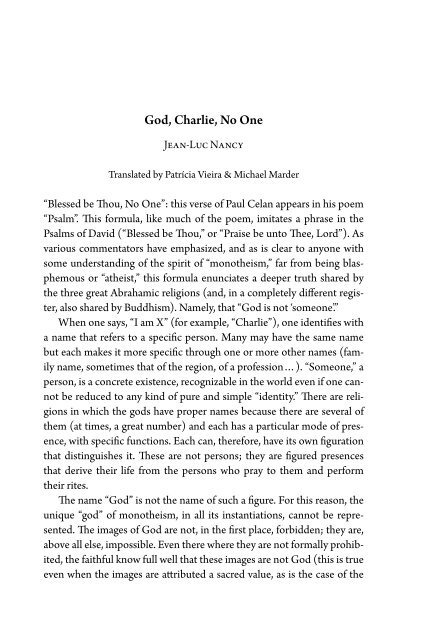The Philosophical Salon
Marder-Vieira_2017_The-Philosophical-Salon
Marder-Vieira_2017_The-Philosophical-Salon
You also want an ePaper? Increase the reach of your titles
YUMPU automatically turns print PDFs into web optimized ePapers that Google loves.
God, Charlie, No One<br />
Jean-Luc Nancy<br />
Translated by Patrícia Vieira & Michael Marder<br />
“Blessed be Thou, No One”: this verse of Paul Celan appears in his poem<br />
“Psalm”. This formula, like much of the poem, imitates a phrase in the<br />
Psalms of David (“Blessed be Thou,” or “Praise be unto <strong>The</strong>e, Lord”). As<br />
various commentators have emphasized, and as is clear to anyone with<br />
some understanding of the spirit of “monotheism,” far from being blasphemous<br />
or “atheist,” this formula enunciates a deeper truth shared by<br />
the three great Abrahamic religions (and, in a completely different register,<br />
also shared by Buddhism). Namely, that “God is not ‘someone’.”<br />
When one says, “I am X” (for example, “Charlie”), one identifies with<br />
a name that refers to a specific person. Many may have the same name<br />
but each makes it more specific through one or more other names (family<br />
name, sometimes that of the region, of a profession…). “Someone,” a<br />
person, is a concrete existence, recognizable in the world even if one cannot<br />
be reduced to any kind of pure and simple “identity.” <strong>The</strong>re are religions<br />
in which the gods have proper names because there are several of<br />
them (at times, a great number) and each has a particular mode of presence,<br />
with specific functions. Each can, therefore, have its own figuration<br />
that distinguishes it. <strong>The</strong>se are not persons; they are figured presences<br />
that derive their life from the persons who pray to them and perform<br />
their rites.<br />
<strong>The</strong> name “God” is not the name of such a figure. For this reason, the<br />
unique “god” of monotheism, in all its instantiations, cannot be represented.<br />
<strong>The</strong> images of God are not, in the first place, forbidden; they are,<br />
above all else, impossible. Even there where they are not formally prohibited,<br />
the faithful know full well that these images are not God (this is true<br />
even when the images are attributed a sacred value, as is the case of the


